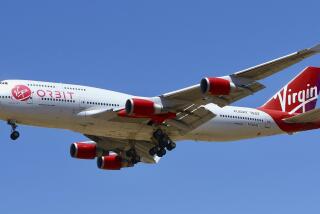S.D. Firm Wins Satellite Launch Contract : Navy Deal May Be Worth Up to $550 Million to General Dynamics
- Share via
SAN DIEGO — In a deal that could ultimately be worth up to $550 million, General Dynamics has been selected to provide rocket launch services for up to 10 Navy communications satellites, the biggest boost yet to its bid to become a force in the growing commercial space launch business.
Under terms of the sale, General Dynamics will provide at least one Atlas rocket costing about $55 million to launch a Navy communications satellite into orbit in 1992 from Cape Canaveral, Fla. General Dynamics will be a subcontractor to Hughes Aircraft of El Segundo, which will build the $172-million satellite as well as manage the launch.
Although the Navy has committed to buy just one Ultra High Frequency Follow-On satellite, the contract calls for up to nine additional satellite launches through 1995, bringing the contract’s potential value to General Dynamics to $550 million.
Beat Industry Leader
Although the expectation is that expendable launch vehicles will be used, Hughes Aircraft spokesman Richard Dore cautioned that the Navy has the option of using future space shuttle missions to place some of the other UHF satellites, if ordered.
To win the contract, General Dynamics beat out Martin Marietta Astronautics of Denver and industry leader Arianespace of France. With McDonnell Douglas Space Systems of Huntington Beach, the companies are the biggest players in the $1-billion-per-year commercial launch industry.
Analysts said the deal will propel General Dynamics to a level equal to its competitors in the U.S. commercial rocket launch business, a market that developed in the aftermath of the space shuttle Challenger disaster in 1986. The 10 Navy launches would bring the total Atlas launches in the works to 28, of which 17 are purely commercial contracts.
The contract, however, will result in minimal additional jobs at General Dynamics Space Systems’ manufacturing facilities in San Diego, general manager Alan Lovelace said Tuesday. That’s because the company has been steadily gearing up for the private launches over the past two years, investing $300 million in expanded facilities and increasing payroll to more than 4,700 from 3,000 in 1987.
“It’s very important for (General Dynamics), in terms of the size of the contract plus that it was sought after by other contractors, including Martin Marietta,” said George Podrasky, an aerospace analyst with Duff & Phelps in Chicago. “They had assumed a lot of risk in going ahead with the commercial Atlas, and the chance they took proved to be the correct one.
Soon after the Challenger disaster, the National Aeronautics and Space Administration suspended all placement of commercial satellites by the manned space craft. Before the moratorium, NASA bought rockets from aerospace manufacturers and managed all launches. But with NASA out of the picture, a new market dominated by private manufacturers was created.
Gaining Strength
Arianespace, which launches its spacecraft from French Guiana in South America, had a head start in commercial rocket business, getting started in 1980. Arianespace thus far has launched 41 payloads in 24 launches from French Guiana and has a backlog to launch 33 payloads.
But McDonnell Douglas, Martin Marietta and now General Dynamics are gaining strength in the market. The first U.S. commercial launch is scheduled for Aug. 25, when a Hughes telecommunications satellite built for British Space Broadcasting will be launched from Cape Canaveral atop a $50-million McDonnell Douglas Delta rocket.
McDonnell Douglas Space Systems, which employs 8,000 at its Huntington Beach manufacturing facility, has eight additional commercial launches scheduled through 1991, spokesman Tom Williams said Tuesday.
Martin Marietta Astronautics Group, which employs 10,000 at its Denver manufacturing base, has contracted to launch six payloads in five launches aboard its Titan rockets, the first of which, an Intelsat VI telecommunications satellite, is scheduled for lift off this fall, a spokeswoman said Tuesday.
Chris Bellavita, an assistant professor of public administration at University of Southern California’s Washington Public Affairs Center who tracks the commercial rocket launch industry, said the contract is good news for General Dynamics.
“People are estimating there is a market for 10 to 15 (commercial) launches a year,” Bellavita said. “With Ariane the strongest player, the best estimates are that the U.S. side cannot support three companies in the industry. This contract puts General Dynamics in position to be better off than the other two (U.S) companies.”
More to Read
Inside the business of entertainment
The Wide Shot brings you news, analysis and insights on everything from streaming wars to production — and what it all means for the future.
You may occasionally receive promotional content from the Los Angeles Times.










